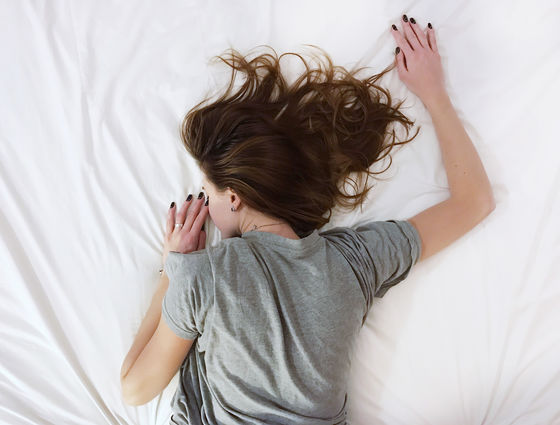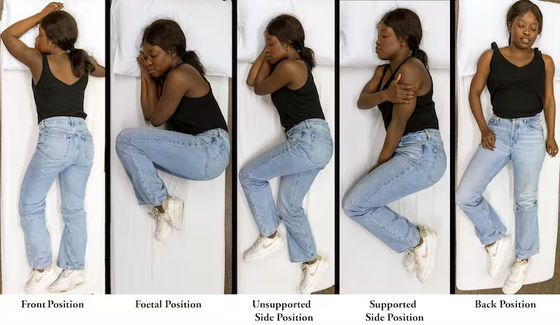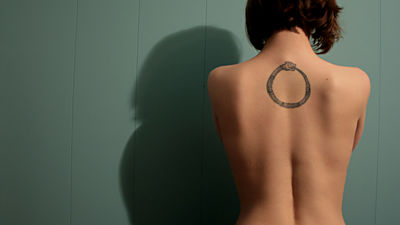Is there a 'correct posture during sleep'? Explained by scientists

Many sleep-related studies have revealed that
What position should I sleep in, and is there a 'right' way to sleep?
https://theconversation.com/what-position-should-i-sleep-in-and-is-there-a-right-way-to-sleep-189873
Past studies have shown that most people prefer to sleep on their side. Sleeping on your side seems like a good thing, as it has been shown that people who sleep on their backs are more likely to have poor sleep and have trouble breathing during sleep .
Humans are known to have very poor sleep patterns and move their bodies frequently during sleep. According to an experiment conducted on 664 subjects, on average, the sleep posture of the subjects was sideways 54%, supine 37%, prone 7%, and sideways is overwhelmingly common. It is clear. In addition, it was also found that among the subjects, men under the age of 35 frequently moved their bodies during sleep, and the proportion of changing postures and moving arms, thighs, and upper back was high.

It's not that moving your body while you sleep is bad, it's actually considered a good thing. During sleep, the human body tracks pain and discomfort and adjusts posture accordingly. As a result, it is possible to avoid the occurrence of
Therefore, Mr. Moro recommends securing a space where you can move around to the left and right of your body in your sleeping bed. Also, if you have a partner or pet who sleeps in the same bed and that person is taking up a lot of space on your bed, consider changing your sleeping position to create more space or buying a larger bed. Please,' said Moro.

Moro also said that it is important to be 'comfortable' when sleeping. He pointed out that there is no high-quality research that clearly shows the ``optimal sleeping position for everyone,'' and that age, weight, environment, and whether or not you are pregnant
The ideal is to 'find a position that allows you to sleep soundly at night.' Everyone has a sleeping position that is comfortable for them, but in one study , people who slept in a ``position in which the spine is rotating (the Unsupported Side Position below)'' were better in other positions. It has been shown that people complain of more body pain when awake than those who sleep. Therefore, if you tend to sleep in a posture that twists your spine, you may want to try changing your sleeping position.

If you sleep on your side, there are some postures that put a strain on your spine, as shown in the image above, but in
In addition, choosing the right pillow is also important for a good night's sleep, says Moro. Lack of head and neck support during sleep has been shown to negatively affect the spine, causing neck and shoulder pain, muscle stiffness, and other problems.
What is clear about pillows is that the pillow material does not affect the spine . In addition, 'shape' and 'height' are important for pillows, U-shaped pillows help you sleep longer , and roll-shaped pillows help people with chronic pain suffer from morning aches and pains. It has also been found to help reduce pain at bedtime .
In addition, it seems that there is no research that can answer the question of what is the optimal mattress from a scientific point of view at the time of writing the article. However, Moro argues that if the mattress loses its hardness, the spring sounds louder, or there are obvious signs of wear, it should be replaced. Mattresses are known to last longer and be more comfortable when you use different sides, so it's recommended that you turn your mattress over at least once or twice a year.

In addition, Mr. Moro says, 'Set the room temperature low,' as advice for getting a good night's sleep. It seems that the optimum temperature for sleeping is 18.3 degrees (range of 15 to 19 degrees), and it has been revealed that high room temperature adversely affects sleep .
Also, it is important to ensure air flow in the bedroom . Ensuring air flow not only brings in fresh air, but also helps to remove heat build-up in the room and keep the room temperature comfortable and cool.
In addition, certain types of antihistamines are known to make it easier to fall asleep. On the other hand, caffeine etc. greatly affect the quality of sleep, so it seems better not to take it considering sleep.
In addition , waking up to go to the bathroom during the night can also affect sleep, so it is recommended that you go to the bathroom before going to bed.
Related Posts:
in Science, Posted by logu_ii







